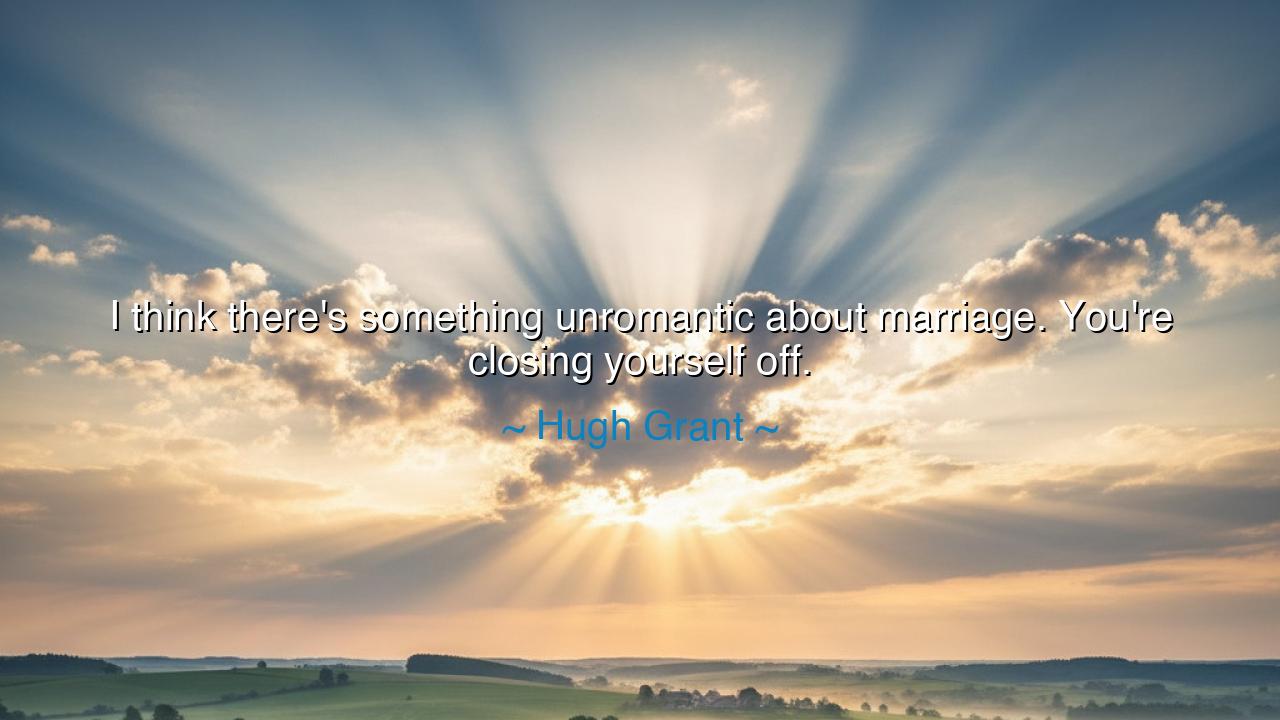
I think there's something unromantic about marriage. You're






In the words of Hugh Grant, “I think there’s something unromantic about marriage. You’re closing yourself off.” These words strike like a paradox, for they seem to wound the very idea that many hold sacred. Yet within them lies a deep observation about human longing, freedom, and the tension between passion and permanence. Grant names the fear that in binding oneself to one, the doors to all others are forever closed—that in choosing a single love, one loses the mystery, the chase, and the endless possibility that often feed the fires of romance.
The ancients, too, wrestled with this dilemma. They saw marriage not merely as the joining of hearts, but as the weaving of lives into a single fabric. To some, this was noble and necessary; to others, it seemed a burden upon desire. In the poems of Sappho, love was celebrated as a flame that burned brightly, sometimes outside the bonds of convention. In the philosophy of Plato, love was seen as a ladder to the divine, not confined to contracts or institutions. Thus, the struggle between romance as passion and marriage as duty is as old as civilization itself.
History gives us clear mirrors. Consider the figure of Lord Byron, the great poet of the Romantic age. He rebelled against convention, seeking love in fleeting passions, refusing to be chained by marriage. To him, as to Hugh Grant, the permanence of binding oneself to one person seemed to extinguish the thrill of freedom. Yet Byron’s restless pursuits brought both ecstasy and ruin. His life shows us that while the fear of “closing yourself off” may preserve freedom, it may also deny the depth and stability that comes when two souls endure together.
But let us not dismiss Grant’s words too quickly. There is truth in them, for romance thrives on mystery, on the unknown, on the wild dance of uncertainty. When love is bound by vows and routine, it risks losing that sharpness of desire, that sense of infinite possibility. Marriage, when approached without care, can indeed feel like a closing of doors, a narrowing of the world, a descent into predictability. The challenge, then, is not to deny the truth of his words, but to seek how romance and marriage might be reconciled.
For the ancients also knew that permanence has its own romance. Odysseus returning to Penelope after twenty years—choosing her again after all trials and temptations—is no less romantic than the first spark of love. To endure, to remain, to love despite familiarity, is itself a heroic act. Thus, while marriage may close the door to countless fleeting loves, it may open the greater door to a single, enduring passion—one that is not consumed in a moment, but grows into something deeper, richer, and far more mysterious.
The lesson for us is this: do not let the fear of “closing yourself off” blind you to the possibility of a deeper freedom. For in choosing one, you may find not imprisonment, but a new landscape of love that cannot be seen from the heights of passing desire. At the same time, remember that marriage must be nurtured, lest it truly become unromantic. Romance must be rekindled within marriage; doors must be opened not outward to others, but inward to new depths of intimacy, trust, and shared discovery.
Practical actions flow from this wisdom. Keep romance alive by continuing to surprise and cherish your partner as you did at the beginning. Embrace commitment not as loss, but as a foundation for deeper love. Balance freedom and loyalty, recognizing that true love is not a prison but a chosen bond. And above all, do not fear closing doors, for often, in closing the many, you find the one door that leads to the vastest horizon of all—the journey of two souls walking together through the long, mysterious years.
Thus, Hugh Grant’s words, though skeptical, invite us to reflect on the tension between freedom and commitment. To some, marriage may feel unromantic, a narrowing of possibility. But to those who see beyond, it may reveal the greatest romance of all: not the thrill of many fleeting loves, but the heroic beauty of choosing one love, again and again, until the end of days.






AAdministratorAdministrator
Welcome, honored guests. Please leave a comment, we will respond soon